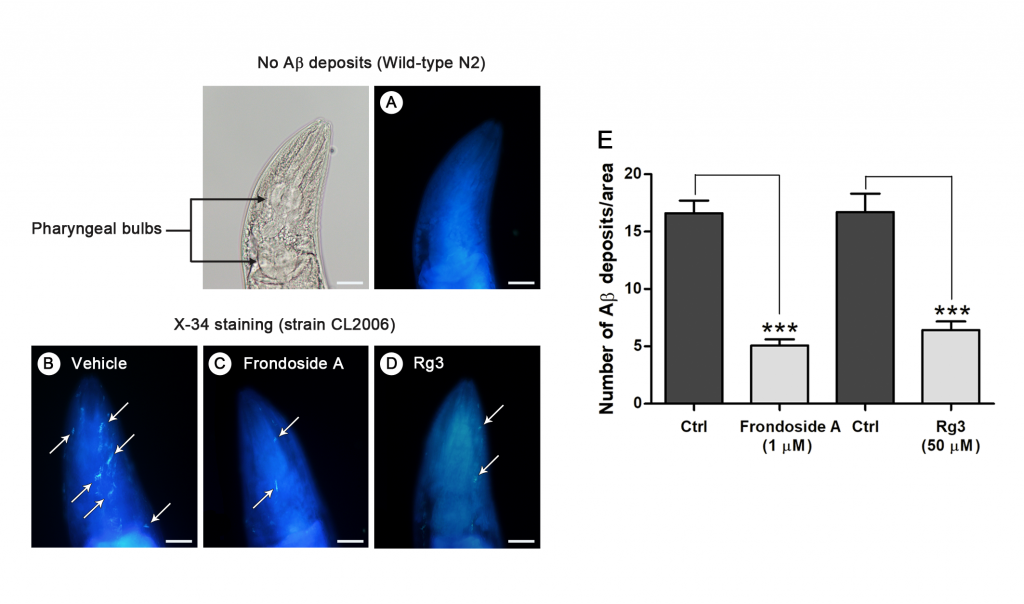
สาร frondoside A บรรเทาการทำลายเซลล์ประสาทโดยยับยั้งการเกาะกลุ่มของโปรตีน amyloid-beta ในสัตว์ทดลองต้นแบบ Caenorhabditis elegans
ที่มาและความสำคัญ
โรคความจำเสื่อม Alzheimer เป็นโรคความเสื่อมของระบบประสาทซึ่งเกิดจากการเกาะกลุ่มกันของโปรตีน amyloid-beta และส่งผลเสียต่อการทำงานของเซลล์ประสาทในระยะยาว การศึกษาวิจัยนี้แสดงให้เห็นฤทธิ์ของสาร frondoside A จากปลิงทะเล Cucumaria frondosa ในการลดการเกาะกลุ่มของโปรตีน amyloid-beta ในหนอน Caenorhabditis elegans ที่ใช้เป็นสัตว์ทดลองต้นแบบของโรค Alzheimer โดยสาร frondoside A มีผลโดยตรงในการลดระดับ amyloid-beta oligomers ที่เป็นพิษต่อเซลล์ ขณะที่ปริมาณ monomers ไม่มีการเปลี่ยนแปลง และยังส่งผลฟื้นฟูการทำงานของเซลล์ประสาทให้ดีขึ้น รวมถึงการลดปริมาณอนุมูลอิสระที่สะสมด้วย การศึกษานี้จึงแสดงให้เห็นถึงศักยภาพของสาร frondoside A ในการป้องกันโรค Alzheimer และนำไปสู่การวิจัยพัฒนาต่อยอดในอนาคตต่อไป
Abstract
Oligomeric assembly of Amyloid-β (Aβ) is the main toxic species that contribute to early cognitive impairment in Alzheimer’s patients. Therefore, drugs that reduce the formation of Aβ oligomers could halt the disease progression. In this study, by using transgenic Caenorhabditis elegans model of Alzheimer’s disease, we investigated the effects of frondoside A, a well-known sea cucumber Cucumaria frondosa saponin with anti-cancer activity, on Aβ aggregation and proteotoxicity. The results showed that frondoside A at a low concentration of 1 µM significantly delayed the worm paralysis caused by Aβ aggregation as compared with control group. In addition, the number of Aβ plaque deposits in transgenic worm tissues was significantly decreased. Frondoside A was more effective in these activities than ginsenoside-Rg3, a comparable ginseng saponin. Immunoblot analysis revealed that the level of small oligomers as well as various high molecular weights of Aβ species in the transgenic C. elegans were significantly reduced upon treatment with frondoside A, whereas the level of Aβ monomers was not altered. This suggested that frondoside A may primarily reduce the level of small oligomeric forms, the most toxic species of Aβ. Frondoside A also protected the worms from oxidative stress and rescued chemotaxis dysfunction in a transgenic strain whose neurons express Aβ. Taken together, these data suggested that low dose of frondoside A could protect against Aβ-induced toxicity by primarily suppressing the formation of Aβ oligomers. Thus, the molecular mechanism of how frondoside A exerts its anti-Aβ aggregation should be studied and elucidated in the future.
KEYWORDS: amyloid-β, oligomers, Alzheimer’s disease, frondoside A, Caenorhabditis elegans
Citation: Tangrodchanapong T, Sobhon P and Meemon K (2020) Frondoside A Attenuates Amyloid-b Proteotoxicity in Transgenic Caenorhabditis elegans by Suppressing Its Formation. Front. Pharmacol. 11:553579.
https://doi: 10.3389/fphar.2020.553579
RELATED SDGs: 3. GOOD HEALTH AND WELL-BEING
ผู้ให้ข้อมูล: รองศาสตราจารย์ ดร.ไกร มีมล
ชื่ออาจารย์ที่ทำวิจัย: รองศาสตราจารย์ ดร.ไกร มีมล
ชื่อนักศึกษาที่ทำวิจัย: นายทวีศักดิ์ ตั้งโรจนพงษ์
แหล่งทุนวิจัย: Royal Golden Jubilee (RGJ) Ph.D. Scholarship
Tags: Alzheimer’s disease, amyloid-β, Caenorhabditis elegans, frondoside A, oligomers
